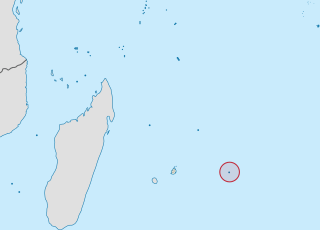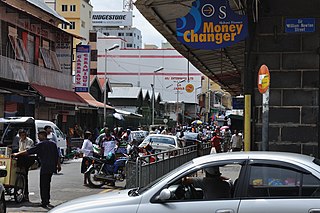| Agalega Creole | |
|---|---|
| kreol | |
| Native to | Agalega Islands |
Native speakers | <1,000[ citation needed ] |
French Creole
| |
| Language codes | |
| ISO 639-3 | None (mis) |
mfe-aga | |
| Glottolog | None |
| IETF | mfe-u-sd-muag |
Agalega creole is a creole language influenced by French spoken in Agalega. [1] It has been heavily influenced by both Mauritian Creole and Seychellois Creole, as well as Malagasy. The population of speakers number just under 1,000.[ citation needed ]

Mauritius, officially the Republic of Mauritius, is an island nation in the Indian Ocean about 2,000 kilometres (1,200 mi) off the southeast coast of the African continent, east of Madagascar. It includes the main island, as well as Rodrigues, Agaléga and St. Brandon. The islands of Mauritius and Rodrigues, along with nearby Réunion, are part of the Mascarene Islands. The main island of Mauritius, where most of the population is concentrated, hosts the capital and largest city, Port Louis. The country spans 2,040 square kilometres (790 sq mi) and has an exclusive economic zone covering 2.3 million square kilometres.

This article is about the demographic features of the population of Mauritius, including population density, ethnicity, education level, health of the populace, economic status, religious affiliations and other aspects of the population.

Creole peoples are ethnic groups typically associated with European colonial settlers, in particular but not always, when those Europeans and their colony-born descendants interbred with West Africans, Indigenous American peoples, or other Europeans; this process is known as creolization.

Rodrigues is a 108 km2 (42 sq mi) autonomous outer island of the Republic of Mauritius in the Indian Ocean, about 560 km (350 mi) east of Mauritius. It is part of the Mascarene Islands, which include Mauritius and Réunion. Rodrigues is of volcanic origin and is surrounded by coral reef, and some tiny uninhabited islands lie just off its coast. The island used to be the tenth District of Mauritius; it gained autonomous status on 10 December 2002, and it is governed by the Rodrigues Regional Assembly. The capital of the island is Port Mathurin.
Mauritius is a multi-ethnic and multi-language society; it is also a plural society with its population mainly composed of four ethnic groups and four major religious groups; it is often depicted as a "rainbow nation". The island of Mauritius did not have any indigenous population; historically, it was characterized by successive waves of European colonization and multiple immigrations. Under the French rule between 1715 and 1810, slaves were imported on the island from mainland Africa and Madagascar; slavery were only abolished in 1835 under the British rule. Indian migrants from Pondicherry first came in Mauritius under the French rule in 1736; The 18th century also saw one the earliest influx of Chinese migrants in Mauritius, who mostly came from Fujian. Under the British rule, more Indian migrants came to Mauritius following the slave emancipation of 1835. Since the 1800s Chinese migrants from Southern China arrived in Mauritius since the 1800s first as indentured labourers and later as free merchants. Since 1860, Hakka immigration started and continued until they become the dominant Chinese population in Mauritius since the beginning of the 20th century. The co-existence of Mauritians of Indian, African, European, and Chinese ancestry eventually led to a sharing of values and cultures, a collective participation in festivals, and an increased understanding between people of different ethnic backgrounds. Mauritians from different cultural backgrounds are very distinct from each other, and it is also highly unpopular to encourage the dissolution of cultural boundaries in Mauritius. In present days, the Mauritian society continues to be culturally and linguistically French-dominated.

Agaléga are two outer islands of Mauritius located in the Indian Ocean, about 1,000 kilometres (620 mi) north of Mauritius island. The population of the islands as at July 2011 was estimated at 300. The islands have a total area of 2,600 ha. The North island is 12.5 km (7.8 mi) long and 1.5 km (0.9 mi) wide, while the South island is 7 km (4.3 mi) long and 4.5 km (2.8 mi) wide. The North Island is home to the islands' airstrip and the capital Vingt Cinq. The islands are known for their coconuts, the production of which is their main industry, and for the Agalega day gecko.

Sega is one of the major music genres of Mauritius and Réunion. The other genres common in Mauritius are its fusion genre Seggae and Bhojpuri songs while in Réunion there is also seggae and maloya. It has origins in the music of slaves as well as their descendants Mauritian Creole people and is usually sung in Mauritian Creole or Réunionese Creole. Sega is also popular on the islands of Agaléga and Rodrigues as well as Seychelles, though the music and dances differ and it is sung in these islands' respective creole languages. In the past, the Sega music was made only with traditional instruments like ravanne and triangle, it was sung to protest against injustices in the Mauritian society, this particular version of the Sega is known as Santé engagé. Other types of Sega have been included in UNESCO's Intangible Cultural Heritage lists.

A French creole, or French-based creole language, is a creole language for which French is the lexifier. Most often this lexifier is not modern French but rather a 17th-century koiné of French from Paris, the French Atlantic harbors, and the nascent French colonies. By the eighteenth century, Creole French was the first language of many people including those of European origin in the Caribbean. French-based creole languages today are spoken natively by millions of people worldwide, primarily in the Americas and on archipelagos throughout the Indian Ocean. This article also contains information on French pidgin languages, contact languages that lack native speakers.
Indo-Mauritians or Indian Mauritians are Mauritians who trace their ethnic ancestry to India or other parts of South Asia.
Mauritian Creoles are the people on the island of Mauritius and in the wider overseas Mauritian diaspora who trace their roots to continental Black Africans who came to Mauritius as slaves. It also refers to members of the island's mixed race or Métis community if they happen to be christian. In government records, creoles along with Franco-Mauritians form part of the broader group known as Population Générale.

The Mauritius Broadcasting Corporation (MBC) is the national public broadcaster of the Republic of Mauritius, that is the islands of Mauritius, Rodrigues, and Agaléga. The headquarters of the MBC is found at Réduit, Moka, it also operates a station in Rodrigues. The MBC programmes are broadcast in 12 languages, notably French, Creole, English, Hindi, Urdu, Bhojpuri, Tamil, Telugu, Marathi, Mandarin/Cantonese, and Hakka, it provides 17 television channels in Mauritius, 4 in Rodrigues and 2 in Agaléga and 7 radio channels.

The following outline is provided as an overview of and topical guide to Mauritius:
Rodriguan Creole is a dialect of Mauritian Creole, a French-based creole language, spoken on the island of Rodrigues in the Indian Ocean. It is spoken by virtually all 40,000 inhabitants of the island. On Rodrigues, like in the rest of the republic of Mauritius, English is the administrative language and French is also widely spoken, even more commonly than English.
Chagossian creole is a French-based creole that was still spoken in 1994 by the 1,800 or so Chagossians, the former inhabitants of the Chagos Archipelago evicted in the early 1970s. It is currently spoken mainly in Mauritius and the Seychelles. There is also a small minority community speaking the language in the United Kingdom.
Bourbonnais Creole is the group of French-based creole languages spoken in the western Indian Ocean. The close relation of the languages is from the similar historical and cultural backgrounds of the islands. The name is derived from the former name of Réunion Island: Bourbon Island before 1793. Another name is Mascarene Creole, as the predominant island group is called the Mascarenes.

The Constitution of Mauritius mentions no official language. It only contains a statement in Article 49 that "The official language of the Assembly shall be English but any member may address the chair in French," implying that English and French are official languages of the National Assembly (parliament). However, the majority language and lingua franca of the country is the French-based Mauritian Creole, spoken at home by 86.5% of the population. Bhojpuri is the second most spoken language in Mauritius, used by 5.3%. The usage of this language is decreasing day by day. English is used as the prime medium of instruction in public schools while French is also a common language in education and the dominant language of media. According to the Organisation internationale de la Francophonie, 72.7% of the Mauritians were French speakers in 2005. Mauritius shares this distinction of being both English- and French-speaking with Burundi, Canada, Cameroon, Dominica, Rwanda, Seychelles and Vanuatu.
The mass media in Mauritius is limited by its small population size. Nonetheless, Mauritius has a robust economy, and there are a number of major media outlets, including print newspapers, radio and television stations.
Mauritian Australians are Australians of Mauritian descent, or who were born in Mauritius.

Mauritian Creole or Morisien is a French-based creole language spoken in Mauritius. English words are included in the standardized version of the language. In addition, the slaves and indentured servants from cultures in Africa and Asia left a diverse legacy of language in the country. The words spoken by these groups are also incorporated into contemporary Morisien.